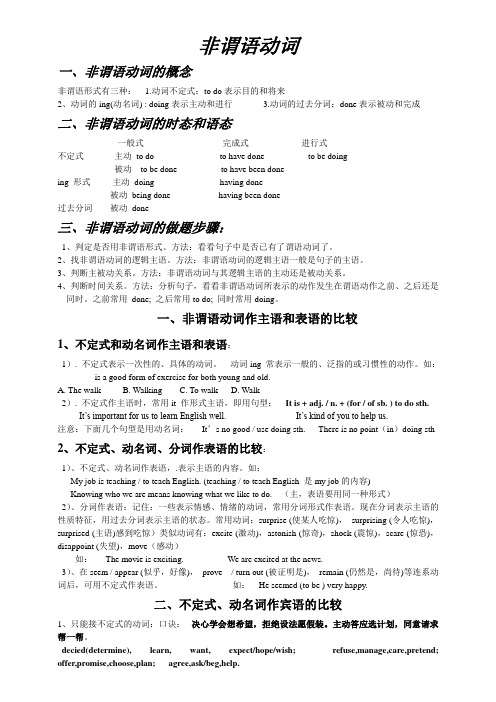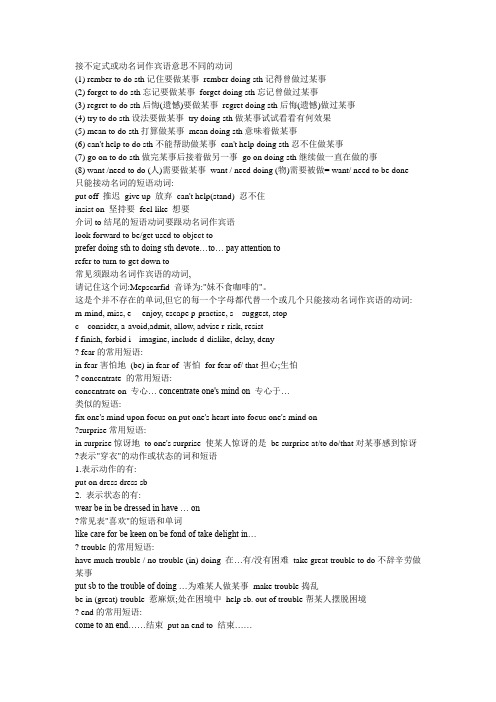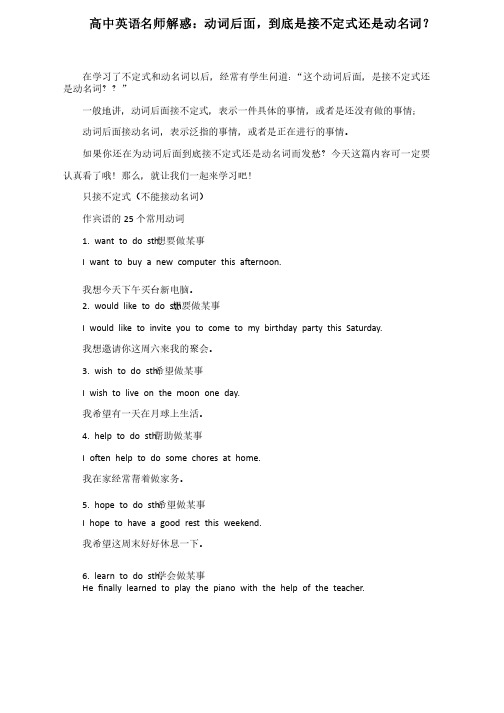接不定式与动名词意义不同的动词
英语什么时候用不定式?什么时候用动名词?

英语什么时候用不定式?什么时候用动名词?1)动名词与不定式的区别:动名词表达的是:状态,性质,心境,抽象,经常性,已发生的不定式表达的是:目的,结果,原因,具体,一次性,将发生的2)接不定式或动名词,意义相同.3)在下列情况下,一般要用不定式:①hate,like,love前有would(should)时,如:I'd like to have a cup of coffee.②当谓语动词begin,continue,start等是进行式时,如:Thestudents are starting to work on the di fficult maths problem.③begin,continue,start与know,understand等状态动词连用时,如:I soon began to understand what was happening.⒋advise,allow,encourage,forbid,permit等动词后接动名词作宾语,或带不定式作宾语补足语.如:Our teachers don't permit our swimming in the lake.Our teachers don't permit us to swim in the lake.4)部分动词后接不定式或动名词时,意义差别较大,应根据句子语境选择使用.①forget,remember,regret后接不定式,表示现在或未来的动作,接动名词表示动作已经发生.如:Don't forget fo post the letter for me.Have you forgotten meeting her in Beijing Airport?Remember to close the windows before you leave.I remember writing him a letter a year ago.We regret to tell you that all of you are not invited toattend the meeting.They regretted ordering these books from abroad.动名词与不定式语义不同的有11 组:1 stop to do stop doing2 forget to do forget doing3 remember to do remember doing4 regret to do regret doing5 cease to do cease doing6 try to do try doing7 go on to do go on doing8 afraid to do afraid doing9 interested to do interested doing10 mean to do mean doing11 begin/ start to do begin/ start doing。
动词不定式与动名词作宾语的区别

动词不定式与动名词作宾语的区别英语中有的及物动词只能跟动名词作宾语;有的及物动词只能跟动词不定式作宾语;但也有及物动词的宾语既是动名词又是动词不定式。
区别在于:一、在want,decide,promise,refuse,agree,wish,hope,expect等及物动词后面的宾语只能是动词不定式,不是动名词。
如:1.I want to have a talk with her.我想跟她谈谈。
2.Our teacher decided to stay with us.老师决定留下来与我们在一起。
3.My English teacher promised to lend some books to me.我的英语老师答应借给我一些书。
4.My mother refused to go there with us.我妈妈拒绝和我们一起去那里。
二、在一些动词后要求只跟动名词作宾语:1、在finish,enjoy,mind,suggest,practise,admit承认advise建议allow允许appreciate 感激,avoid避免,consider考虑,delay推迟,deny 否认,discuss 讨论,dislike 不喜欢,enjoy 喜爱,escape 逃脱,excuse 原谅,fancy 设想,finish 完成,forbid 禁止,forgive 原谅,give up 放弃,imagine 想像,keep 保持,mention 提及,mind 介意 miss 没赶上,pardon 原谅,permit 允许,practise练习,prevent 阻止,put off 推迟,report 报告,risk 冒险,stop 停止,suggest 建议,understand 理解。
1.I advise waiting a few more days. 我建议再等几天。
2.I admit breaking the window. 我承认窗子是我打破的。
动词后接动词不定式/动名词作宾语用法小结

动词后接动词不定式/动名词作宾语用法小结动词是英语中最活跃的词性之一,其主要作用是在句中作谓语。
在谓语动词后接动词作宾语时,主要分为两种情况:Ⅰ动词加动词不定式能以不定式做宾语的动词很多,常见的有:want,hope,wonder,wish,agree,try,manager,offer,decide,fail,refuse,ask,pretend,intend,attempt,teach,discuss等。
例如:I have learned to drive the car.They refused to accept my suggestion.He promised to come.Ⅱ动词加动名词在enjoy, appreciate, admit, consider, mind, avoid., miss, can’t help, deny, practise, allow, finish, imagine, forbid, suggest等这些动词之后要求用动名词作宾语。
例如:Have you finished repairing your car?She suggested spending another week in the country.Do you feel like taking a walk.通常要后接动名词作宾语的动词英语中有些动词后接另一个动词作宾语时,通常要用不定式,不用动名词,这类动词主要admit(承认), advise(建议), allow(允许), appreciate(感激), avoid(避免), consider(考虑), delay(推迟), discuss(讨论), dislike(不喜欢), enjoy(喜爱), escape(逃脱), excuse(原谅), fancy(没想到), finish(完成), forbid(禁止), forgive(原谅), give up(放弃), imagine(想像), keep(保持), mention(提及), mind(介意), miss(没赶上), pardon(原谅), permit(允许), practise(练习), prevent(阻止), put off(推迟), report(报告), resist(忍住), risk(冒险), stop(停止), suggest(建议), understand(理解)等。
(完整版)高考英语非谓语动词知识点

非谓语动词一、非谓语动词的概念非谓语形式有三种: 1.动词不定式:to do表示目的和将来2、动词的ing(动名词) : doing表示主动和进行 3.动词的过去分词:done表示被动和完成二、非谓语动词的时态和语态一般式完成式进行式不定式主动to do to have done to be doing被动to be done to have been doneing 形式主动doing having done被动being done having been done过去分词被动done三、非谓语动词的做题步骤:1、判定是否用非谓语形式。
方法:看看句子中是否已有了谓语动词了。
2、找非谓语动词的逻辑主语。
方法:非谓语动词的逻辑主语一般是句子的主语。
3、判断主被动关系。
方法:非谓语动词与其逻辑主语的主动还是被动关系。
4、判断时间关系。
方法:分析句子,看看非谓语动词所表示的动作发生在谓语动作之前、之后还是同时。
之前常用done; 之后常用to do; 同时常用doing。
一、非谓语动词作主语和表语的比较1、不定式和动名词作主语和表语:1). 不定式表示一次性的、具体的动词。
动词ing 常表示一般的、泛指的或习惯性的动作。
如:________ is a good form of exercise for both young and old.A. The walkB. WalkingC. To walkD. Walk2). 不定式作主语时,常用it 作形式主语,即用句型:It is + adj. / n. + (for / of sb. ) to do sth.It’s important for us to learn English well. It’s kind of you to help us.注意:下面几个句型是用动名词:It’s no good / use doing sth. There is no point(in)doing sth2、不定式、动名词、分词作表语的比较:1)、不定式、动名词作表语,.表示主语的内容。
哪些动词后接不定式与动名词意义不同

那些动词后接不定式与动名词意义不同1.remember(记得),forget(忘记),regret(后悔)后接不定式表示动作尚未发生,后接动名词(可用一般式或完成式)表示动作已经发生。
比较:Remember to mail it. 记得把它寄掉。
Don’t forget to give my love to Helen. 别忘了向海伦问好。
I remember seeing her somewhere. 我记得在哪里见过她。
I forgot telling her the news. 我忘了曾告诉过她这个消息。
2.go on 后接不定式表示接着做另一事,接动名词表示不停地做某事。
如:He went on to show us how to do it. 他接着又教我们如何做。
You can’t go on working all night without a rest. 你不能通宵工作而不休息。
注:go on doing sth中的doing也可视为现在分词而非动名词。
3.mean 后接不定式表示打算做某事,后接动名词表示意味着做某事。
如:He did not mean to hurt you. 他不是有意要伤害你。
This illness will mean going to hospital. 得了这种病就意味着要住院。
4.try 后接不定式表示设法去做某事,接动名词表示做某事试试(看有何效果)。
如:Try to be serious for a moment. 设法正经一会儿。
Try phoning his home number. 给他家里打个电话试试。
5.can’t help后接动名词表示情不自禁地去做某事,接不定式表示不能帮忙去做某事。
如:We can’t help thinking he’s still alive. 我们总是认为他还活着。
The medicine can’t help to get rid of your cold. 这药不能帮你消除感冒。
动词不定式和动名词的比较

dread toΒιβλιοθήκη do sth/ dread doing sth
neglect to do sth/ neglect doing sth
should(would) like和should(would) love 后须接动词不定式 • I’d like to have another try. • I’d love to come tomorrow. feel like后面须接动名词 • I feel like coming tomorrow.
动词不定式和动名词的比较
应
斌
可以接动名词或动词不定式的动词或短语
love like hate prefer dislike intend want dread neglect regret omit delay can’t bear forget try decline等。 某些这类词的两种接续在意义上几乎没有区别。
try
•
• • •
He’ll try to finish the work as early as possible. He’ll trying making a model ship.
He stopped watching TV and began to do homework. He stopped to do his homework. 类似的动词还有 mean deserve quit 等。
stop
有些动词后面跟不定式和跟动名词所表示的 意义完全不同或者相反 remember • I remember telling him to lock the door. • I will remember to tell her this good news. forget • I forget telling him to lock the door • I forget to tell her this good news.
接动词不定式和动名词的动词汇总

高考英语固定搭配汇总一、接不定式而不接动名词作宾语的24个常用动词afford to do sth. 负担得起做某事 agree to do sth. 同意做某事arrange to do sth. 安排做某事ask to do sth. 要求做某事 beg to do sth. 请求做某事 care to do sth. 想要做某事choose to do sth. 决定做某事 decide to do sth. 决定做某事demand to do sth. 要求做某事determine to do sth. 决心做某事 expect to do sth. 期待做某事fear to do sth. 害怕做某事help to do sth. 帮助做某事 hope to do sth. 希望做某事 learn to do sth. 学习做某事manage to do sth. 设法做某事 offer to do sth. 主动提出做某事 plan to do sth. 计划做某事prepare to do sth. 准备做某事pretend to do sth. 假装做某事promise to do sth. 答应做某事refuse to do sth. 拒绝做某事want to do sth. 想要做某事wish to do sth. 希望做某事注:有些不及物动词后习惯上也接不定式;不接动名词:aim to do sth. 打算做某事fail to do sth. 未能做某事long to do sth. 渴望做某事happen to do sth. 碰巧做某事hesitate to do sth. 犹豫做某事struggle to do sth. 努力做某事二、接不定式作宾补的36个常用动词advise sb. to do sth. 建议某人做某事 allow sb. to do sth. 允许某人做某事ask sb. to do sth. 请叫某人做某事 bear sb. to do sth. 忍受某人做某事beg sb. to do sth. 请求某人做某事cause sb. to do sth. 导致某人做某事command sb. to do sth. 命令某人做某事drive sb. to do sth. 驱使某人做某事elect sb. to do sth. 选举某人做某事encourage sb. to do sth. 鼓励某人做某事expect sb. to do sth. 期望某人做某事 forbid sb. to do sth. 禁止某人做某事force sb. to do sth. 强迫某人做某事 get sb. to do sth. 使要某人做某事hate sb. to do sth. 讨厌某人做某事 help sb. to do sth. 帮助某人做某事intend sb. to do sth. 打算要某人做某事invite sb. to do sth. 邀请某人做某事leave sb. to do sth. 留下某人做某事 like sb. to do sth. 喜欢某人做某事mean sb. to do sth. 打算要某人做某事 need sb. to do sth. 需要某人做某事oblige sb. to do sth. 迫使某人做某事 order sb. to do sth. 命令某人做某事permit sb. to do sth. 允许某人做某事 persuade sb. to do sth. 说服某人做某事 prefer sb. to do sth. 宁愿某人做某事 request sb. to do sth. 要求某人做某事remind sb. to do sth. 提醒某人做某事teach sb. to do sth. 教某人做某事tell sb. to do sth. 告诉某人做某事 train sb. to do sth. 训练某人做某事trouble sb. to do sth. 麻烦某人做某事 want sb. to do sth. 想要某人做某事warn sb. to do sth. 警告某人做某事wish sb. to do sth. 希望某人做某事三、接动名词不接不定式作宾语的34个常用动词admit doing sth. 承认做某事 advise doing sth. 建议做某事 allow doing sth. 允许做某事appreciate doing sth. 感激做某事 avoid doing sth. 避免做某事 consider doing sth. 考虑做某事delay doing sth. 推迟做某事 deny doing sth. 否认做某事 discuss doing sth. 讨论做某事dislike doing sth. 不喜欢做某事 enjoy doing sth. 喜爱做某事 escape doing sth. 逃脱做某事excuse doing sth. 原谅做某事 fancy doing sth. 设想做某事 finish doing sth. 完成做某事forbid doing sth. 禁止做某事 forgive doing sth. 原谅做某事 give up doing sth. 放弃做某事imagine doing sth. 想象做某事 keep doing sth. 保持做某事 mention doing sth. 提及做某事mind doing sth. 介意做某事 miss doing sth. 错过做某事 pardon doing sth. 原谅做某事permit doing sth. 允许做某事 practice doing sth. 练习做某事 prevent doing sth. 阻止做某事prohibit doing sth. 禁止做某事 put off doing sth. 推迟做某事 report doing sth. 报告做某事risk doing sth. 冒险做某事 stop doing sth. 停止做某事 suggest doing sth. 建议做某事understand doing sth. 理解做某事四、接现在分词作宾补的20个常用动词bring sb. doing sth.引起某人做某事catch sb. doing sth. 碰上撞上某人做某事discover sb. doing sth. 发现某人做某事 feel sb. doing sth. 感觉某人做某事find sb. doing sth. 碰上撞上某人做某事get sb. doing sth. 使某人做某事have sb. doing sth. 使某人做某事hear sb. doing sth. 听见某人做某事keep sb. doing sth. 使某人不停地做某事 listen to sb. doing sth. 听某人做某事look at sb. doing sth. 看着某人做某事 notice sb. doing sth. 注意到某人做某事observe sb. doing sth. 观察某人做某事 prevent sb. doing sth. 阻止某人做某事see sb. doing sth. 看见某人做某事send sb. doing sth.使某人突然做某事set sb. doing sth. 使引起某人做某事start sb. doing sth. 使某人开始做某事 stop sb. doing sth. 阻止某人做某事 watch sb. doing sth. 观察某人做某事五、接动词原形作宾补的11个常用动词feel sb. do sth. 感觉某人做某事have sb. do sth. 使某人做某事hear sb. do sth. 听见某人做某事 let sb. do sth.让某人做某事listen to sb. do sth. 听着某人做某事 look at sb. do sth. 看着某人做某事make sb. do sth. 使某人做某事notice sb. do sth. 注意某人做某事observe sb. do sth. 观察某人做某事 see sb. do sth. 看见某人做某事watch sb. do sth. 观察某人做某事接不定式或动名词作宾语意思不同的8个动词1remember/forget/regret to do 记住/忘记/后悔遗憾要做某事remember/forget/regret doing 记住/忘记/后悔遗憾曾做过某事2try to do sth. 设法要做某事try doing sth. 尝试做某事3mean to do sth. 打算做某事mean doing sth. 意味着做某事4can’t help to do sth. 不能帮助做某事can’t help doing sth. 情不自禁做某事5go on to do sth. 做完某事后接着做另一事go on doing sth. 继续做一直在做的事6stop to do sth. 停止正在做的事stop doing sth. 停下来去做另一事。
接不定式或动名词作宾语意思不同的动词

接不定式或动名词作宾语意思不同的动词(1) rember to do sth记住要做某事rember doing sth记得曾做过某事(2) forget to do sth忘记要做某事forget doing sth忘记曾做过某事(3) regret to do sth后悔(遗憾)要做某事regret doing sth后悔(遗憾)做过某事(4) try to do sth设法要做某事try doing sth做某事试试看看有何效果(5) mean to do sth打算做某事mean doing sth意味着做某事(6) can't help to do sth不能帮助做某事can't help doing sth忍不住做某事(7) go on to do sth做完某事后接着做另一事go on doing sth继续做一直在做的事(8) want /need to do (人)需要做某事want / need doing (物)需要被做= want/ need to be done只能接动名词的短语动词:put off 推迟give up 放弃can't help(stand) 忍不住insist on 坚持要feel like 想要介词to结尾的短语动词要跟动名词作宾语look forward to be/get used to object toprefer doing sth to doing sth devote…to… pay attention torefer to turn to get down to常见须跟动名词作宾语的动词,请记住这个词:Mepscarfid 音译为:"妹不食咖啡的"。
这是个并不存在的单词,但它的每一个字母都代替一个或几个只能接动名词作宾语的动词: m-mind, miss, e--- enjoy, escape p-practise, s---suggest, stopc---consider, a-avoid,admit, allow, advise r-risk, resistf-finish, forbid i --imagine, include d-dislike, delay, deny? fear的常用短语:in fear害怕地(be) in fear of 害怕for fear of/ that担心;生怕? concentrate 的常用短语:concentrate on 专心… concentrate one's mind on 专心于…类似的短语:fix one's mind upon focus on put one's heart into focus one's mind on?surprise常用短语:in surprise惊讶地to one's surprise 使某人惊讶的是be surprise at/to do/that对某事感到惊讶?表示"穿衣"的动作或状态的词和短语1.表示动作的有:put on dress dress sb2. 表示状态的有:wear be in be dressed in have … on?常见表"喜欢"的短语和单词like care for be keen on be fond of take delight in…? trouble的常用短语:have much trouble / no trouble (in) doing 在…有/没有困难take great trouble to do不辞辛劳做某事put sb to the trouble of doing …为难某人做某事make trouble捣乱be in (great) trouble 惹麻烦;处在困境中help sb. out of trouble帮某人摆脱困境? end的常用短语:come to an end……结束put an end to 结束……on end竖起, 连续in the end终于; 最后end up (by) doing…以……结束make both ends meet收支相抵? 表示"导致"、"由…引起"的短语:1. 导致cause sth. (to do) result in lead to2. 由……引起be caused by result from grow out of lie in?表"全力以赴"的短语:do / try one's best spare no efforts to do take great pains to do go all out to dodo what somebody can (do) to do do all somebody can (do) to do? direction常用短语:in (the ) direction of….朝……方向under the direction of ...在…的指导下follow the directions 照说明去做? far常用短语:far from (being)离……要求相差很远far from +(a place)距离某地很远far away遥远so far 到目前为止; 那么远as far as sb. knows/sees据某人所知by far (最高级前,比较级后)起强调作用? distance常用短语:in the distance在远处from/ at a distance从远处keep sb. at a distance 与某人保持一定距离It is no distance at all.不远? use常用短语:used to do过去曾经、常做be used to doing …习惯于…… be used to do被用来做……make good/ full use of充分利用…… come into use开始使用…… it is no use doing …干……没有用?"出了什么事"的几种不同表达What's wrong with….? What's the matter with…? What's the trouble with…? What happened (to sb.) ??"众所周知"常用表达法:It is known to all that…主语从句,that不能省As is known to all,定语从句,置于句首We all know (that)后接宾语从句Everyone knows (that)后接宾语从句, which is known to all.非限定从句,置于句末?表"同意某人意见"的常用短语:agree with sb. /what sb. Said agree to sth. approve (of) sth.in favour of sth. be agreeable to sth. be for sth."不同意"disagree with sb./ what sb. Said object to sth. disapprove (of) sth. be against sth.? sign的常用短语:sign one's name签名sign to sb (not) to do sth. 示意某人(不)做某事signs of ………的迹象?would rather 与prefer 的区别1.宁愿做……而不做……would rather do A than do B prefer A to B prefer to do A rather than do B2. would rather 主语+ 过去式,表示"宁愿"eg. I would rather you came tomorrow than today.should prefer sb. to do sth./ should prefer 主语+ 过去式,表示"比较喜欢……"eg. I should prefer you not to go there alone.OR: I should prefer that you did not go there alone.?trap常用短语be caught in a trap落入圈套be led into a trap中圈套set a trap to do sth.设圈套…… be trapped in sth.被…..所围困? grow常用短语in the grow of在….成长中grow up长大; 成长grow rich on靠….. 变富grow into长成…… grow out of由…..引起/滋生出? supply, provide, offer 的区别:1.表示"向某人提供某物"supply / provide sb. with sth. supply / provide sth. for sb. supply sth. to sb. offer sb. sth.2. 表示"主动提出做某事"offer to do sth.3. 表示"倘使"、"假如"provided / providing that= on condition that=only if4. 表示"满足需要"supply / meet a need.? supply的常用短语in short supply 缺乏,不足medical/military supply医疗/军用品supplies of…许多? lack的常用短语be lacking in sth. 在……不足make up for the lack of 弥补……的不足for/by/from/through lack of…由于…不足,缺乏have no lack of不缺?damage的常用短语do damage/harm to 对……有害cause damage to 对……造成损害ask for damage要求赔偿?threaten常用短语threaten sb. with sth.用……威胁某人threaten to do…威胁做…… under the threat of…在……的威胁下?speed常用短语speed up加速at the speed of…以…..的速度with great speed迅速?aim常用短语take aim at瞄准reach an aim达到目的aim at瞄准、针对?permit与allow 的区别表"允许做某事"或"允许某人做某事"用法基本相同。
动词后接动名词和不定式作宾语的区别

英语教材里后接动名词和不定式作宾语的动词一、有些动词只能接不定式做宾语。
例如:help,hope,ask,refuse,decide,promise,wish,pretend,expect,learn,plan,manage,agree,fail,offer,happen,seem等等。
例如:He refused to speak on the radio.二、有些动词或短语只接动名词做宾语:mind,finish,enjoy,suggest,consider,miss,keep(on),avoid避开,躲开,stand(忍受),allow ,practicegive up,put off,look forward to期待,期望,feel like想要做某事,prevent…from,阻止can't help禁不住,不由自主迫不及待,be/get used to ,be worth doing,be busy doing例如:His wife doesn't allow smoking inside the room and often advised him to give up smoking.I'm looking forward to hearing from you soon.She doesn't feel like eating anything,being ill for a few days.三、有些动词后面既可接不定式,又可接动名词,其意义基本相同,区别不大。
如;like,love,hate,prefer.begin,start.注意:begin和start本身为进行时,或后面动词为心理变化意义的动词时,须接不定式。
例如:When we came in, they were beginning to have supper.After his explanation, I began to understand it / realize that I was wrong.四、有些词后面既可以接不定式.亦可接动名词,但其意义有很大区别,须特别注意:A.remember,forget,接动名词,表示完成意义(=having done),接不定式,表示将来意义:例如:Please remember to bring me the book I want next time. I remember seeing her(=having seen her) somewhere before.B.mean:mean to do=want to do打算,想要……;mean doing:意味着,就是例如:I am sorry, I didn't mean to hurt your feelings,Learning a foreign languagedoesn't mean just working in class.C.stop:stop to do停下来,要干另一件事,不定式作目的状语;stop doing停止干……,动名词作宾语。
初中英语动词固定搭配——接不定式和动名词含义不同动词

初中英语动词固定搭配——接不定式和动名词含义完全不同动词既可接不定式也可接动名词,但含义完全不同动词1. remember to do sth. 记住要做某事(未做)remember doing sth. 记得做过某事(已做)Remember to close the door,please.记着关门.I remember closing the door.我记得关了门了.2. forget to do sth. 忘记去做某事(未做)forget doing sth. 忘记做过某事(已做)The light in the office is stil on. He forgot to turn it off.办公室的灯还在亮着,他忘记关了.He forgot turning the light off.他忘记他已经关了灯了.3. regret to do sth. 遗憾要做某事(未做)regret doing sth. 后悔/抱歉做过某事(已做)I regret to tell you that you can't pass the examination.我很遗憾地通知你你不能通过这次考试.I regret disturbing yo so long.我很抱歉打扰了你那么久.4. try to do sth. 努力做某事try doing sth. 尝试做某事He tries to get the apple above the shelf. But fails to reach it. After a while ,Brown comes in and try showing his ability.他努力去够架子上的苹果,但是没能够到。
过了一会儿,布朗近来尝试表现他的能力。
5. mean to do sth. 计划做某事mean doing sth. 意味着做某事I meant to go, but my father would not allow me to.我想去,但是我父亲不肯让我去。
动名词不定式(可以接不定式或动名词的动词大集合)

后接动名词的动词admit 承认/ advise 建议/ allow 允许/ appreciate 感激/ avoid 避免/ consider 考虑/ delay 推迟/ deny 否认/ discuss 讨论/ dislike 不喜欢/ enjoy 喜爱/ escape 逃脱/ excuse 原谅/ fancy 设想/ finish 完成/ forbid 禁止/ forgive 原谅/ imagine 想像/ keep 保持/ mention 提及/ mind 介意/ miss 没赶上/ pardon 原谅/ permit 允许/ practise 练习/ prevent 阻止/ prohibit 禁止/ put off 推迟/ report 报告/ risk 冒险/ stop 停止/ suggest 建议/ carry on 继续/ can’t help 禁不住/ feel like 想要/ give up 放弃/ keep on 继续/ put off 推迟/ set about 开始,着手/ object to 反对/ insist on 坚持/ pay attention to 注意/ stick to 坚持/ get down to 开始认真做/ look forwards to 期盼/ be [get] used to 习惯于/ lead to 导致/ be devoted to 致力于,专用于,后接不定式作宾语的动词afford 负担得起/ arrange 安排/ ask 要求/ care 想要/ choose 决定/ decide 决定/ demand 要求/ determine 决心/ expect 期待,预计/ help 帮助/ hesitate 犹豫/ hope 希望/ long 渴望/ manage 渴望设法/ offer 主动提出/ plan 计划/ prepare 准备/ pretend 假装/ promise 答应/ refuse 拒绝/ want 想要/ wish 希望,既可接动名词也可接不定式作宾语但意义不同的动词(1) remember(记得),forget(忘记),regret(后悔)后接不定式指该不定式所表示的动作还未发生,后接动名词(有时可用完成式),则指该动名词所表示的动作已经发生。
动词后接不定式与动名词的问题

动词后接不定式与动名词的问题经常会有学生问我:某某动词后,究竟是接不定式还是动名词呢?有没有什么规律呢?某某动词后究竟是接不定式还是动名词,如果单纯从语法或用法的角度进行分析归纳,我觉得会把简单的问题复杂化,很多文章中总结出不是规律的规律多少多少条。
我的建议是:后接不定式还是动名词,很大程度上是英语使用习惯。
坦率地说,我也不一定个个分得清。
好在这些动词都是些常用的词汇,多花点时间记住就可以了。
一、动词加不定式我们先来讲一下动词加不定式的问题。
后接的不定式,一般表示一件具体的事或者是还没有发生的事。
它可以分为三种情况。
1、动词+不定式后接不定式的动词有:afford负担得起 aim针对 agree同意appear 显得 arrange 安排 ask 问attempt企图 bear承受 begin开始beg请求 bother 扰乱 care关心,喜欢cease停止 choose选择 claim要求contrive 设法 consent 同意 decide决定decline推却 demand要求 design设计,预定desire愿望 determine决定 destine注定dread害怕 enable能够 endeavor努力expect期望 fail不能 forget忘记happen碰巧 hate 憎恨 hesitate犹豫hope希望 incline 倾向 intend想要learn学习 like喜欢 loathe 不喜欢long渴望 love爱 manage设法mean意欲 need需要 neglect忽视offer提供 omit忽略 plan计划prefer喜欢 prepare 准备 pretend假装profess表明 promise承诺 propose提议refuse拒绝 regret 抱歉 scorn忽视seek 寻觅 start开始 swear宣誓try试图 undertake 承接 volunteer志愿vow起誓 want想要 wish希望The driver failed to see the other car in time.司机没能及时看见另一辆车。
高中英语名师解惑:动词后面,到底是接不定式还是动名词?

高中英语名师解惑:动词后面,到底是接不定式还是动名词?在学习了不定式和动名词以后,经常有学生问道:“这个动词后面,是接不定式还是动名词??”一般地讲,动词后面接不定式,表示一件具体的事情,或者是还没有做的事情;动词后面接动名词,表示泛指的事情,或者是正在进行的事情。
如果你还在为动词后面到底接不定式还是动名词而发愁?今天这篇内容可一定要认真看了哦!那么,就让我们一起来学习吧!只接不定式(不能接动名词)作宾语的25个常用动词1. want to do sth. 想要做某事I want to buy a new computer this a ernoon.我想今天下午买台新电脑。
2. would like to do sth.想要做某事I would like to invite you to come to my birthday party this Saturday. 我想邀请你这周六来我的聚会。
3. wish to do sth. 希望做某事I wish to live on the moon one day.我希望有一天在月球上生活。
4. help to do sth. 帮助做某事I o en help to do some chores at home.我在家经常帮着做家务。
5. hope to do sth. 希望做某事I hope to have a good rest this weekend.我希望这周末好好休息一下。
6. learn to do sth. 学会做某事He finally learned to play the piano with the help of the teacher. 在老师的帮助下,他最终学会了弹钢琴。
在老师的帮助下,他最终学会了弹钢琴。
7. manage to do sth. 设法做成某事设法做成某事They managed to escape the fire yesterday.昨天他们设法逃脱了火灾。
动名词和不定式

动名词和不定式动词不定式与动名词1、只能⽤动词不定式做宾语的动词(表⽰将来的动作或⾏为)。
decide to do sth. 决定做……want to do sth. 想要做……plan to do sth. 计划做……agree to do sth. 同意做……wish to do sth. 希望做……need to do sth. 需要做……learn to do sth. 学习做……hope to do sth. 希望做……would like to do sth. 想要做……offer to do sth. 主动提出做……refuse to do sth. 拒绝做……look forward to doing sth. 期待做……2、只能接动名词作宾语的动词(表⽰经常性、⼀般性动作或正在进⾏的动作或⾏为)。
enjoy doing sth. 喜欢做……finish doing sth. 完成做……keep doing sth. 保持做……mind doing sth. 介意做……practise doing sth. 练习做……suggest doing sth. 建议做……advoid doing sth. 避免做……miss doing sth. 怀念做……3、动词ing和动词不定式做宾语的动词。
①意义差别不⼤like doing sth. (经常性)喜欢做……love doing sth. 喜欢做……like to do sth. (具体的)喜欢做……love to do sth. 喜欢做……hate doing sth. 讨厌做……begin doing sth. 开始做……hate to do sth. 讨厌做……begin to do sth. 开始做……continue doing sth. 继续做……continue to do sth. 继续做……②意义完全不同remember doing sth. 记得做过某事forget doing sth. 忘记做过某事remember to do sth. 记住要做某事forget to do sth. 忘记去做某事stop doing sth. 停⽌做某事try doing sth. 尝试做某事stop to do sth. 停下来去做另⼀事try to do sth. 尽⼒去做某事go on doing sth. 继续做(同⼀事)go on to do sth. 做完⼀件事后,接下去做另外⼀件事4、动词不定式作宾语补⾜语。
动词后接不定式和动名词的区别

一.动词后接不定式和动名词的区别1. Stop to do 停止,中断做某事后去做另一件事Stop doing 停止正在做的某事They stopped to smoke a cigarette.I must stop smoking.2. Forget to do 忘记要去做Forget doing 忘记做过某事The light in the office is still on. He forgot to turn it off.He forgot turning the light off.3. remember to do 记着去做某事Remember doing 记着做过某事Remember to go to the post office after school.Don’t you remember seeing the man before?4. try to do 设法或努力去做某事Try doing 尝试着做某事You must try to be more careful.I tried gardening but didn’t succeed.5. regret to do 对要做的事情遗憾Regret doing 对做过的事情遗憾,后悔I regret to have to do this, but I have no choice.I don’t regret telling her what I thought.6. mean to do 打算,想Mean doing 意味着I mean to go, but my father would not allow me to.Doing that means wasting time.7. go on to do 放下手中的活,继续去做别的活Go on doing 继续做原来做的活We had supper and went on to watch TV.He didn’t have a rest and went on working.8. be afraid to do 不敢,胆怯去做某事,主观原因不去做意为“怕”Be afraid doing 担心出现doing 所指的状况,结果,doing 是客观造成的结果,意为“生怕”“恐怕”She was afraid to wake her husband up.She was afraid of waking her husband.二.动词不定式做宾补和分词做宾补的区别Look at, see, watch, hear, find, feel 等感官动词后接不定式做宾补时,表示动作的全过程已结束,后接分词做宾补时,表示动作的一部分正在进行。
动词不定式和动名词做宾语的区别

动词不定式和动名词做宾语的区别一、只能接动词不定式to do(作宾语)的动词:hope, expect, agree, promise, intend, plan, want, manage, decide, determine,attempt, pretend, choose,offer, refuse, fail 等。
例如:They all want to play football after class.二、1.只能接动词-ing形式(作宾语)的动词(短语):finish,mind ,admit ,allow ,appreciate ,avoid ,consider ,delay ,enjoy ,imagine ,keep ,miss ,permit practise , risk ,suggest 等。
例如:I admit breaking the window.2.有些短语动词和结构后面也要求跟动名词作宾语。
这样的短语动词常见的有:insist on, be worth,give up,put off,keep on,insist on,look forward to,can't help, be/get used to,spend...in , feel like 等3.在一些特别的句子结构中要求使用动名词:1.) “have problem (+in) + 动名词,2.) have difficulty in doing sth.,3.) be busy (in) + 动名词;4.) waste time (in) + 动名词;5.) There is no use + doing三、在remember,forget, regret, stop,mean 等及物动词后,既可接doing作宾语又可接to do作宾语,但意义不同。
动名词作主语(如果一个动词加上了ing变成了名词,那么这个词称动名词)动名词作主语有如下几种常见情况:1. 直接位于句首做主语。
常用句型动名词与不定式的区别

常用句型动名词与不定式的区别动名词和不定式作为英语语法中常用的词组形式,经常被用于表达特定的含义和语境。
本文将重点介绍动名词与不定式的区别,以帮助读者更好地理解和使用这两种句型。
一、定义和形式1. 动名词(Gerund)是动词的一种形式,以-ing结尾,并且在句中充当名词的角色。
动名词的形式为动词的原形 + -ing,例如:reading, swimming, studying等。
2. 不定式(Infinitive)是动词的一种形式,一般由“to + 动词原形”构成。
例如:to read, to swim, to study等。
二、句法用法1. 主语和宾语(1)动名词作为主语,常用于表达一般性的或已经完成的动作。
例如:Swimming is my favorite hobby.(游泳是我最喜欢的爱好。
)(2)不定式作为主语,常用于表达将来的或可能的动作。
例如:To travel around the world is my dream.(环游世界是我的梦想。
)(3)动名词作为宾语,常用于及物动词之后。
例如:I enjoy swimming in the ocean.(我喜欢在海洋中游泳。
)(4)不定式作为宾语,常用于及物动词之后,并带有to。
例如:She wants to go shopping this weekend.(她想在这个周末去购物。
)2. 补语(1)动名词作为补语,常用于及物动词之后。
例如:I find it interesting watching movies.(我发现看电影很有趣。
)(2)不定式作为补语,常用于及物动词之后,并带有to。
例如:She considers him to be a good friend.(她认为他是个好朋友。
)3. 定语和状语(1)动名词作为定语,修饰名词。
例如:I have a swimming lesson tomorrow.(我明天有一节游泳课。
动词不定式动名词用法归纳

动词的不定式与动名词的用法归纳动词不定式动词不定式:(to)+do,具有名词、形容词、副词的特征。
否定式:not + (to) 被动语态do to be done以do为例,动词不定式的构成如下:不定式的句法功能:(1)作主语:To finish the work in ten minutes is very hard. 十分钟之内完成这项工作是很难的。
To lose your heart means failure. 灰心意味着失败。
动词不定式短语作主语时,常用it作形式主语,真正的主语不定式置于句后,例如上面两句可用如下形式:It is very hard to finish the work in ten minutes. 十分钟之内完成这项工作是很难的。
It means failure to lose your heart. 灰心意味着失败。
常用句式有:1、It+be+名词+to do。
2、It takes sb.+some time+to do。
3、It+be+形容词+of sb +to do。
careless,,clever,good,foolish,honest,kind,lazy,nice,right,silly,stupid, wise,等表示赞扬或批评的形容词,不定式前的sb.可作其逻辑主语。
(2)作表语:Her job is to clean the hall. 她的工作是打扫大厅。
He appears to have caught a cold. 他似乎感冒了。
(3)作宾语:常与不定式做宾语连用的动词有:want, hope, wish, offer, fail, plan, learn, pretend, refuse, manage, help, agree, promise, prefer, 如果不定式(宾语)后面有宾语补足语,则用it作形式宾语,真正的宾语(不定式)后置,放在宾语补足语后面,例如:Marx found it important to study the situation in Russia. 马克思发现研究俄国的情况是很重要的。
接不定式和动名词含义不同的英语动词

接不定式和动名词含义不同的英语动词有的动词后接另一动词作宾语,用作宾语的动词用不定式或动名词均可,但意义不同。
这类动词主要有1. remember(记得),forget(忘记),regret(后悔)后接不定式指该不定式所表示的动作还未发生,后接动名词(有时可用完成式),则指该动名词所表示的动作已经发生。
比较:Don't forget to tell him the news. 别忘告诉他这消息。
I forgot telling her the news. 我忘了曾告诉过她这个消息。
2. try 后接不定式表示设法做某事,接动名词表示做某事试试(看有什么效果) 。
如:I'll try to make fewer mistakes next time. 我下次要少犯一些错误。
Try phoning his home number. 给他家里打个电话试试。
3. mean 后接不定式表示打算(想要)做某事,接动名词表示意味着(要)做某事。
如:I don't mean to praise myself. I have my fault. 我不想赞扬我自己,我有我的缺点。
Missing the train means waiting for an hour. 赶不上火车就意味着要等一个小时。
4. stop 后接动名词表示停止做某事,接不定式表示停下正在做的事去做另一事。
如:Hearing her husband come in she stopped crying. 听见她丈夫进了来,她就不哭了。
They were tired, so they stopped to have a rest. 他们很累了,所以停下来休息一会儿注:后接不定式时,不定式不是宾语,而是目的状语。
5. can’t help后接动名词表示禁不住去做某事,接不定式表示不能帮助做某事。
如:We can't help thinking he's still alive. 我们总是认为他还活着。
- 1、下载文档前请自行甄别文档内容的完整性,平台不提供额外的编辑、内容补充、找答案等附加服务。
- 2、"仅部分预览"的文档,不可在线预览部分如存在完整性等问题,可反馈申请退款(可完整预览的文档不适用该条件!)。
- 3、如文档侵犯您的权益,请联系客服反馈,我们会尽快为您处理(人工客服工作时间:9:00-18:30)。
接不定式与动名词意义不同的动词有些动词后面既可接不定式也可接动名词,但意思明显不同。
这类动词主要有以下几类:
第一类
remember, forget, regret:remember(记得),forget(忘记),regret(后悔)后接不定式表示动作尚未发生,后接动名词(可用一般式或完成式)表示动作已经发生。
比较:Remember to post the letters. 记得把这些信寄掉。
I remember posting the letters. 我记得这些信是寄掉了的。
I forgot to tell him the news. 我忘告诉他这消息了。
I forgot telling her the news. 我忘了曾告诉过她这个消息。
She never regretted doing this. 她从没后悔这样做过。
I regret to tell you that he can’t come. 很抱歉他不能来。
第二类
go on:其后接不定式表示接着做另一事,接动名词表示接着做同样的事或不停地做着同样的事。
如:
Go on to do the other exercises after you have finished this one. 做完这个练习后,
请接着做其它的练习。
You oughtn’t to go on living this way. 你不应该再这样生活下去了。
She nodded, smiled, and went on stitching. 她点了点头,笑了笑,又继续缝衣服。
注:go on后接的doing也可视为现在分词而非动名词。
第三类
mean:其后接不定式表示打算做某事或有意做某事,后接动名词表示意味着做某事。
如:
To raise wages means increasing purchasing power. 提高工资意味着增加购买力。
I’m sorry I didn’t mean to be rude to you. 对不起,我并不想对你粗鲁无礼。
To mean to do something and to actually do something are two different things. 打
算做一件事和实际上做一件事完全是两回事。
第四类
try:其后接不定式表示设法去做某事,接动名词表示做某事试试(看有何效果)。
如:
Try to limit your talk to 10 minutes. 请尽量把话在10分钟内讲完。
Let’s try knocking at the back door. 咱们敲敲后门试试。
第五类
can’t help:其后接动名词表示情不自禁地去做某事,接不定式表示不能帮忙去做某事。
如:
He couldn’t help crying when he heard the news. 他听到这个消息时禁不住哭了。
I can’t help to clean the place up. 我不能帮助打扫这地方。
第六类
stop:其后接动名词表示停止正在做的事情,接不定式表示停下正在做的事去做另外一件事。
如:
He is trying to stop smoking. 他在设法戒烟。
He stopped to speak to Martin. 他停下来和马丁讲话。
